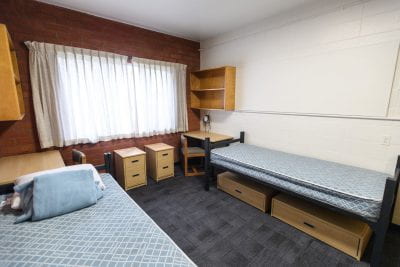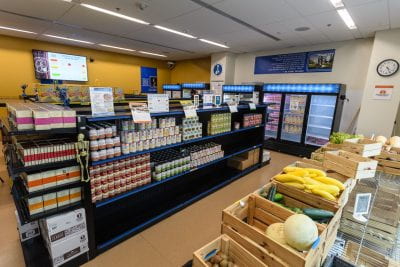SJSU Cares Helps Lift Up Students in Need

Student Affairs Case Manager Victoria Sexton speaks with a student at the SJSU Cares office.
Imagine trying to focus on final exams while worrying about where you will sleep or how to pay for your next meal. In a market as expensive as San José, it’s a struggle faced by many students, from first-year Spartans to PhD candidates. At San José State University, however, help is available.
“I slept in my truck for a couple days, and one of my classmates told me, ‘You should check out SJSU Cares,’” said Luis Jauregui, ’24 Industrial Engineering. “Right away, it was like the next day, they were able to help me out with my financial aid. Once I started getting the help, I could just focus on my work, and wouldn’t have to worry about my living situation. I would live right here in school, which was like the most awesome thing you could ask for.”
SJSU Cares, the university’s program that provides basic needs resources and services to students, works closely with them to address their individual needs and circumstances. This includes emergency and transitional housing, food and emergency financial assistance, and clothing through a partnership with the Office of Sustainability. The university encourages students to ask for help, so they can move beyond a short-term crisis and stay on track for their degree.
“We want students to be successful at San José State because we know higher education is key to transforming lives and livelihoods,” said Interim President Steve Perez. “SJSU Cares was created to be a crucial buffer, a respite from economic emergencies that can derail even the hardest studying student. We know more needs to be done, and with the input of students, we are headed in that direction.”

Students are able to access emergency beds on campus through SJSU Cares.
Enrolled students are eligible for up to 28 days of emergency housing, weekly access to the Spartan Food Pantry, assistance enrolling in CalFresh, financial counseling, and clothing for both everyday wear and career-related activities.
From July 1, 2021, to December 31, 2021, 213 individuals contacted SJSU Cares citing short-term housing as a concern. Of the 173 individuals who followed up with an appointment with a case manager, every student received assistance — 80% were resolved by securing financial aid, a housing referral, assistance with leases or a grant; 13% through short- or long-term housing using the university’s partnership with the Bill Wilson Center; and 7% through emergency housing available on campus.
SJSU Cares’ quarterly update for Jan. through March 2022 reflects similar trends though, overall, requests for housing resources were lower than at the end of 2021.
“Most students need money to pay rent or secure a lease, while others need a short-term residence as they shift to a new place, sometimes preferring to stay off campus. What’s most important is any student who works with SJSU Cares receives assistance with housing and other basic needs,” said Ben Falter, senior student affairs case manager who oversees the program.
Falter also wants students to know they do not need to take out loans or maximize loans to receive assistance, that those who are undocumented are welcome, and, ultimately, students determine which forms of assistance are right for them.
A 12-bed pilot program launched in fall 2021, with Associated Students providing funding for the fall semester. The program is now funded by the university and will continue indefinitely. The program is one of several options offered to students in need of emergency housing. Additional short-term options are offered through hotel vouchers, while longer stays are coordinated through the Bill Wilson Center.
“For the program to succeed over the long term, it must be built with input from those it serves,” Perez emphasized. “We appreciate the passion and input of the Student Homeless Alliance and other stakeholders. It is not always an easy path, but it is one that will take us to a higher place.”
Raising awareness
To spread the word about SJSU Cares and overcome any stigma about asking for help, the university has launched an awareness campaign that is promoted via social media, on-campus digital signs, tabling events and outreach by UPD officers who may be among the first to see students sleeping outside. The effort features current SJSU students sharing their experiences with SJSU Cares, including the use of emergency housing services.

The Spartan Food Pantry celebrated its three-year anniversary in March by welcoming its 50,000th student visitor.
“We appreciate the willingness of students to step forward and openly share their experiences,” said Perez. “This helps normalize conversations about basic needs and overcome the stigma some may feel about asking for help. Ensuring students know about SJSU Cares and the services available to them is a priority of the university.”
In November 2021, SJSU Cares opened a new office on the first floor of Clark Hall, providing further visibility and a space for students to confidentially meet with case managers. Throughout the COVID-19 pandemic, SJSU Cares assisted students who faced basic needs insecurity, through referrals to CalFresh and with the Spartan Food Pantry, which welcomed its 50,000th student visitor last month, and was among the services most utilized.
If you need help, fill out the request for assistance form.
Facts from SJSU Cares
- SJSU Cares provides resources and services for SJSU students facing many kinds of unforeseen financial crises. If you’re having trouble paying for food, off-campus housing or other bills, come to SJSU Cares to get the help you need.
- If you find yourself living in shelters, parks, motels or cars, or temporarily couch-surfing because you have nowhere else to go, SJSU Cares provides support for obtaining stable, regular and adequate housing.
- Are you currently enrolled and living in an unsafe environment and have nowhere else to go? Are you homeless or at risk of becoming homeless soon? You may be eligible for the Rapid Rehousing, a housing assistance program in partnership with the Bill Wilson Center.
- No student should have to face food insecurity. The Spartan Food Pantry is a full-service, staffed, walk-in food-assistance program, offering non-perishable goods, fresh produce and refrigerated items to eligible students.
Related Stories

Lucas College and Graduate School of Business Ranked in Top 40 Online MBA Programs, No. 1 Among California Public Universities

2025: Year in Review

Commencement Profile: Bryan McCray on Building Community and Creating Local Change

